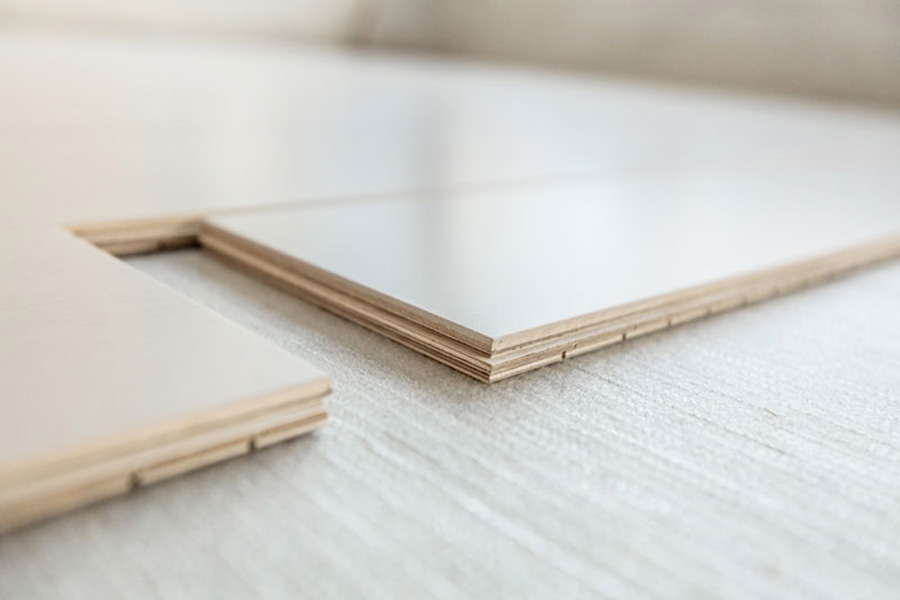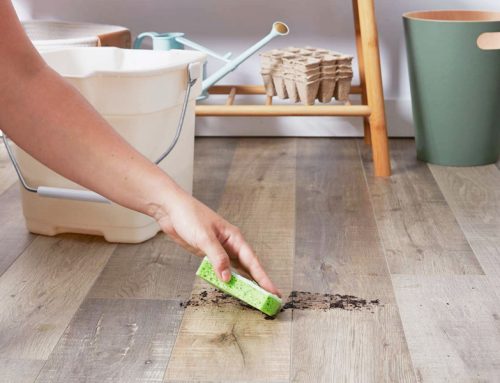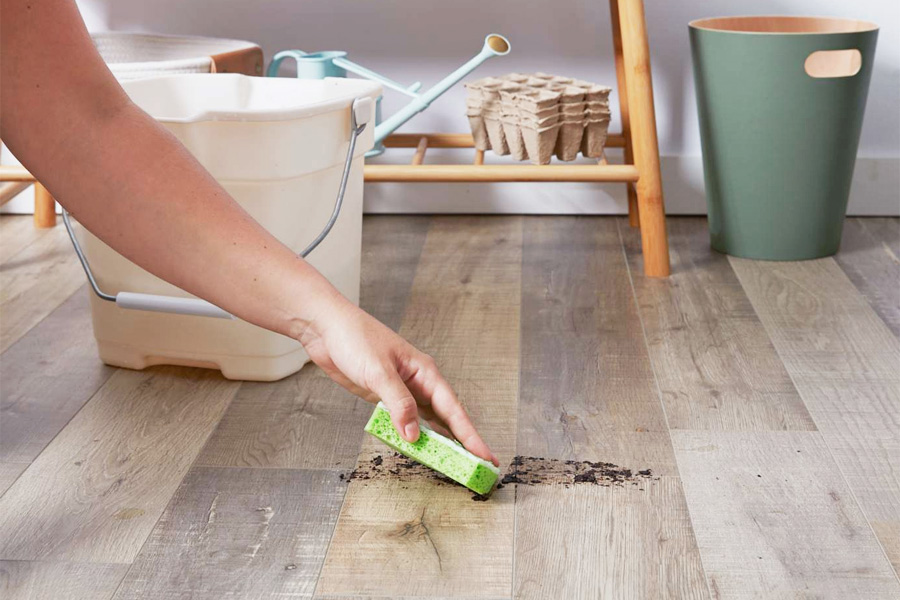If you’re considering wood floors for your home, engineered wood flooring is definitely an option worth exploring. In this guide, our flooring experts will go over what is engineered wood flooring, the manufacturing process, pros and cons, features, and more.
By the end, you’ll have a thorough understanding of engineered wood flooring and be better equipped to make an informed flooring decision.
So, let’s get started!
What Is Engineered Wood Flooring
Engineered wood flooring is a type of wood flooring that combines the natural beauty of wood but with added durability and stability.
Your probably like, Huh? Well, let us explain!
Unlike solid hardwood, which is made entirely of solid wood planks, engineered wood flooring is constructed with a top layer of real hardwood veneer, backed by layers of plywood or high-density fiberboard. This layered construction provides the appearance and durability of solid wood while offering enhanced resistance to moisture, temperature changes, and warping. Making it better suited for bathrooms, kitchens, and even basements!
It is available in a wide range of wood species, finishes, and plank sizes, allowing homeowners to achieve their desired look and feel for any room in your home.
How is Engineered Wood Flooring Made
Engineered wood flooring is made through a careful manufacturing process:
1. It starts with the creation of the plywood core, which consists of multiple layers of wood veneer stacked and glued together. This plywood core serves as the foundation of the flooring, providing stability and resistance to moisture.
2. On top of the plywood core, a thin layer of real hardwood veneer is adhered, ranging from 0.6mm to 4mm in thickness. This top layer is precisely cut from solid wood planks, providing the genuine look and feel of natural wood flooring.
3. The veneer layer is then finished with stains, oils, or lacquers to protect the wood and enhance its appearance.
Engineered Wood Flooring Features
Engineered wood flooring offers a range of features that contribute to its popularity among homeowners just like you!
Appearance & Texture
One of the key features of engineered wood flooring is its wide range of appearances and textures.
Engineered wood flooring is available in various wood species, including popular options such as white oak, maple, hickory, and more. Each wood species has its own unique appearance, from the elegant grain of white oak to the warm tones of hickory.
Engineered wood flooring provides a natural wood texture, adding depth and character to any room. Whether you prefer a rustic, traditional, or modern look, engineered wood flooring offers the versatility to suit your design preferences.
Durability & Longevity
Engineered wood flooring is known for its durability and longevity. The layered construction of engineered wood flooring, with the plywood core providing stability, allows it to withstand the wear and tear of daily use. Its resistance to moisture and temperature changes also contributes to its overall durability, reducing the risk of warping or shrinking.
With proper care and maintenance, engineered wood flooring can last for decades, maintaining its appearance and integrity over time. This durability makes engineered wood flooring a great investment for homeowners, as it has the potential to withstand the demands of busy households and retain its value for many years to come.
Sizes & Varieties
Engineered wood flooring offers a variety of sizes and varieties, allowing homeowners to find the perfect fit for their living spaces.
The thickness of engineered flooring boards can vary, typically ranging from 3/8 inch to 3/4 inch, depending on the product. This range of thickness provides options for different wear and tear needs, with thicker boards offering increased durability.
Engineered wood flooring comes in various widths, from narrow planks for a more traditional look to wider planks for a modern aesthetic. These size options allow for customization, ensuring that homeowners can choose the dimensions that best suit their rooms and design preferences.
Maintenance & Care
Maintenance and care of engineered wood flooring are relatively straightforward, making it an ideal choice for busy homeowners. Regular sweeping or vacuuming, combined with occasional damp mopping, is generally sufficient for keeping engineered wood floors clean and looking their best.
Unlike solid hardwood flooring, engineered wood flooring is less prone to wear and tear, reducing the need for frequent refinishing. Homeowners can also use specific cleaning products designed for engineered wood floors to maintain their luster and protect their surface.
The ease of maintenance and care associated with engineered wood flooring adds to the overall convenience of choosing this type of flooring for your home.
Environmental Impact
For environmentally conscious homeowners, the environmental impact of flooring choices is an important consideration.
When it comes to engineered wood flooring, it can offer a more eco-friendly option compared to traditional solid hardwood flooring. Engineered wood flooring utilizes wood resources more efficiently, as the production process uses less natural wood compared to solid hardwood flooring. This efficient use of wood reduces waste and helps conserve natural resources.
The adhesives used in the manufacturing of engineered wood flooring have low volatile organic compounds (VOC) content, contributing to better indoor air quality. By choosing engineered wood flooring, homeowners can enjoy the natural beauty of wood while making a more sustainable choice for their homes.
Engineered Wood Flooring Cost
The cost of engineered wood flooring is an important factor to consider when choosing the best flooring for your home!
Pricing Factors
The cost of engineered wood flooring can vary based on several factors:
- The size of the area you need to cover with engineered wood flooring will affect the overall cost. Flooring is typically priced per square foot, so the larger the area, the higher the cost.
- Engineered wood flooring that mimics the look of luxury vinyl or exotic wood species may come at a higher price point due to the intricacies of manufacturing and the materials used.
- Some engineered wood flooring products come with a lifetime warranty, which may increase the cost due to the added value and peace of mind offered by the warranty coverage.
Engineered Wood vs. Hardwood Flooring
Solid hardwood flooring is made from solid wood planks, offering a traditional and timeless aesthetic. On the other hand, engineered wood flooring combines a thin layer of real hardwood veneer with plywood or high-density fiberboard, providing enhanced durability and moisture resistance.
While solid hardwood flooring may require more maintenance and has limitations in installation areas, engineered wood flooring offers greater versatility, affordability, and resistance to moisture, making it a popular choice among homeowners.
Differences
When comparing engineered wood flooring and solid hardwood flooring, several key differences come into play.
- Engineered wood flooring consists of a thin layer of real hardwood veneer on top of plywood, while solid hardwood flooring is made entirely of solid wood planks.
- The wear layer of engineered wood flooring, the top layer of real hardwood veneer, can range from 0.6mm to 4mm, depending on the product. Solid hardwood flooring typically has a wear layer of the same thickness as the overall thickness of the plank.
- Engineered wood flooring offers better moisture resistance, making it a suitable choice for areas with fluctuating humidity levels, such as basements or bathrooms, where solid wood flooring may not be recommended.
- Solid hardwood flooring is often seen as a traditional choice, offering a classic and timeless aesthetic, while engineered wood flooring provides a more versatile range of styles, wood species, and finishes, allowing homeowners to achieve the desired look and feel for their space.
- Both types of flooring have their own unique advantages, and the choice between engineered wood and solid hardwood ultimately depends on factors such as budget, installation area, and personal preferences.
- Engineered wood flooring consists of a thin layer of real hardwood veneer on top of plywood, while solid hardwood flooring is made entirely of solid wood planks.
- The wear layer of engineered wood flooring, the real hardwood veneer, can range from 0.6mm to 4mm, while solid hardwood flooring typically has a wear layer of the same thickness as the overall plank.
- Engineered wood flooring offers better moisture resistance than solid hardwood, making it suitable for areas with fluctuating humidity levels, such as basements or bathrooms.
- Solid hardwood flooring is often considered traditional, while engineered wood flooring provides a wider range of styles, wood species, and finishes to choose from.
Similarities
While engineered wood flooring and solid hardwood flooring differ in their construction, they share several similarities.
- Both options provide the natural beauty of wood, enhancing the visual appeal of your interior spaces.
- Engineered wood flooring, with its thin layer of real hardwood veneer, offers a similar aesthetic to solid wood flooring, allowing you to achieve the desired look of hardwood.
- Both types of flooring are available in a variety of wood species, finishes, and plank sizes, giving you the versatility to customize the design according to your preferences.
- You can refinish both engineered wood flooring and solid hardwood flooring, allowing you to restore the surface finish and rejuvenate the natural wood appearance.
- Engineered wood flooring and solid hardwood flooring can increase the resale value of your home, appealing to potential buyers with their timeless charm and durability.
Advantages & Disadvantages of Engineered Wood Flooring
As with any flooring option, engineered wood flooring comes with its own set of pros and cons. Let’s take a closer look at the advantages and disadvantages of choosing engineered wood flooring for your home.
Advantages
Engineered wood flooring offers several advantages that make it a popular choice among homeowners.
- Ease of installation: Engineered wood flooring is designed for easy installation, as it can be installed using the floating installation method, making it a great choice for DIY homeowners.
- Moisture resistance: Engineered wood flooring is more resistant to moisture than solid hardwood flooring, meaning it is less likely to warp or buckle in areas with humidity or potential water exposure.
- Durability: Thanks to its layered construction, engineered wood flooring is more durable and stable than solid hardwood flooring, making it better suited for high-traffic areas of the home.
- Compatibility with radiant heating: Engineered wood flooring can be installed over radiant heating systems, allowing for a warm and cozy floor during the colder months.
- Ease of care: Engineered wood flooring is relatively easy to maintain, requiring regular sweeping or vacuuming and occasional light mopping. This type of flooring is less prone to wear and tear, reducing the need for frequent refinishing.
Disadvantages
While engineered wood flooring has numerous advantages, it’s essential to consider the potential disadvantages as well.
- Limited refinishing options: The thickness of the veneer layer in engineered wood flooring limits the number of times it can be refinished compared to solid hardwood flooring. Thicker veneer layers offer more refinishing opportunities, while thin veneer layers may limit the lifespan of the flooring.
- Perception of potential buyers: Some potential buyers may value solid hardwood flooring more than engineered wood flooring, which could impact the resale value of your home. However, the durability, moisture resistance, and overall appearance of engineered wood flooring can still make it an attractive choice for many buyers.
- Veneer wear: Over time, the veneer layer of engineered wood flooring may wear, affecting the lifespan of the flooring. However, proper maintenance and care can minimize wear and extend the flooring’s life.
- Plank width limitations: Engineered wood flooring may have limitations in the width of the planks available, potentially impacting the design options for homeowners seeking wider planks.
- Reveal of plywood core: In some cases, the veneer layer of engineered wood flooring may wear down, revealing the plywood core. This can affect the aesthetic appeal of the flooring, depending on personal preferences.
Is Engineered Wood Flooring Suitable for Your Home?
Determining if engineered wood flooring is suitable for your home depends on several factors, such as the type of flooring you desire and the specific needs of your space.
Factors to Consider
Consider the following factors when deciding if engineered wood flooring is the right choice for your home.
- Engineered wood flooring is more resistant to moisture and humidity compared to solid hardwood flooring, making it a better choice for rooms with higher moisture levels, such as basements.
- If you prefer the traditional, solid piece installation of solid hardwood flooring, engineered wood flooring may not provide the exact same aesthetic, as it consists of multiple layers.
- Engineered wood flooring can be a great choice for rooms like kitchens or bathrooms, as it offers better resistance compared to solid hardwood flooring, reducing the risk of damage from water splashes or spills.
Conclusion
To summarize, engineered wood flooring offers a practical and stylish alternative to traditional hardwood flooring. It provides the same aesthetic appeal and warmth of real wood while offering added durability and stability. It’s created using multiple layers of wood, making it resistant to moisture and temperature changes. It also requires less maintenance and is more cost-effective compared to solid hardwood flooring.
Whether you’re renovating your home or building a new one, consider the numerous benefits of engineered wood flooring. From its versatility and eco-friendly properties to its impact on resale value, this type of flooring is a smart choice for any homeowner.
If you’re interested in exploring engineered wood flooring options, stop by one of our flooring stores or schedule a free in-home estimate and let our flooring professionals guide you through the selection and installation process.






